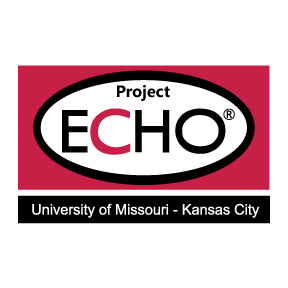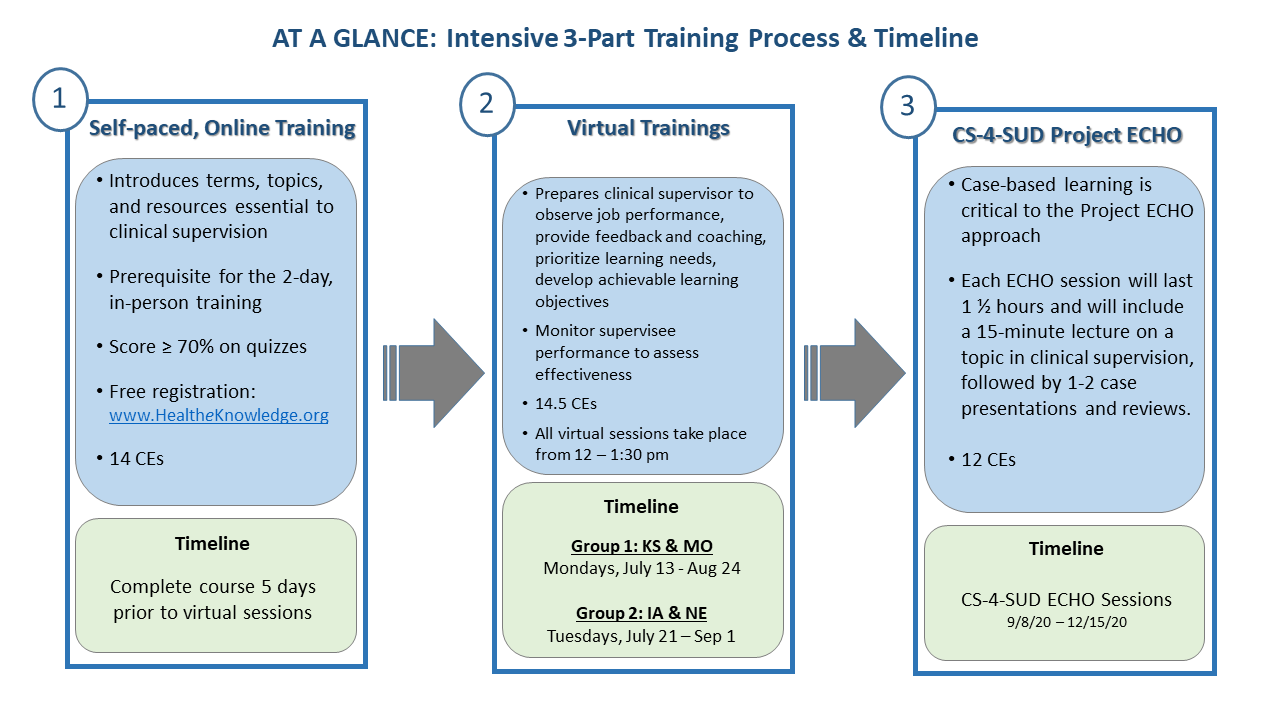The purpose of Project ECHO (Project Extension for Community Healthcare Outcomes) is to democratize medical knowledge and get best practice care to underserved people. Through case-based learning via multipoint videoconferencing (Zoom software), knowledge-sharing networks are created between those with specialty knowledge (hub) and providers (spokes). Typical ECHO clinics include a brief didactic followed by case consultation. See below for information on current and upcoming Project ECHOs hosted by Mid-America ATTC.
Apply now for the Clinical Supervision Intensive Learning Opportunity!
As part of its “Enhancing Workforce Capacity to Provide Clinical Supervision for Substance Use Disorders” (CS-4-SUD) initiative, Mid-America ATTC will host an eight-session Clinical Supervision Project ECHO Clinic. Participants will complete a 14-hour online course followed by 4 virtual trainings on the ATTC Network’s curriculum, “Clinical Supervision Foundations.”

In alignment with the Project ECHO model, each 1 ½-hour ECHO session involves a didactic presentation, an update from one or two of the participants who utilized feedback with their supervisee since their initial presentations, and two new case presentations on supervisee dilemmas to which recommendations are provided. Sessions will begin in August 2020 and run through December 2020.
The clinic Hub team is Christina Boyd, LSCSW, LCAC, and Scott Breedlove, MS, CPS, MARS. Didactic topics include common supervision issues, balancing administrative and clinical tasks, the reflective model of supervision, managing legal and ethical dilemmas, boundaries within supervision, and technology-based distance supervision.
If you have any questions, please contact Project Manager Bree Sherry at [email protected]. Applications are due June 19, 2020. Click here to download the application.
Women and Stimulant Use Project ECHO Series
The Mid-America, Mountain Plains, and South Southwest ATTCs recently concluded the Women and Stimulant Use Project ECHO Series. With increasing rates of stimulant use across our regions and its particular impact among women, the series utilized case-based learning model of Project ECHO to build community capacity to address this growing epidemic. Each session included a didactic presentation followed by two de-identified case presentations related to stimulant use among women.
Resources from the series are below.
10/2/2019: Stimulant Use: Current Trends and the Impact on the User's Brain and Body
Beth Rutkowski, MPH, Director of Training, UCLA Integrated Substance Abuse Programs; Co-Director, Pacific Southwest ATTC
This presentation will describe the local and national scope of stimulants (cocaine and methamphetamine). The mental health and physical health consequences of stimulant use will be presented, including information on the impact of stimulant use on the brain and cognition.
Objectives:
Download Presentation Slides | Watch the Recorded Presentation
10/16/2019: Women and Stimulant Use: Healthy Steps to Freedom
Anne Lindsay, PhD, Associate Professor and Extension Specialist, University of Nevada, Reno
This presentation will address core issues that are unique to female SUD treatment clients in comparison to their male counterparts regarding weight and energy as a driving mechanism to use, triggers for relapse, trends in drug use for women and the complexity of health-related complications and psychosocial needs, prescription medication and over-the-counter drug manipulation.
Objectives
Download Presentation Slides | Watch the Recorded Presentation
10/30/2019: Mamas, Munchkins, and Methamphetamines
Marcela Smid, MD, MA, M.S,, Assistant Professor of Maternal-Fetal Medicine, University of Utah Health
This presentation will address the impact of methamphetamine use during pregnancy on maternal and fetal outcomes. It will also cover current evidence to assist in treatment of women using methamphetamine during pregnancy.
Objectives
Download Presentation Slides | Watch the Recorded Presentation
11/13/2019: Stimulant Use: Responses by the Parenting in Recovery/ Family Drug Treatment Court program
Michelle Kimbrough, LCSW, Parenting in Recovery/ Family Drug Treatment Court Services Manager, Travis County Health and Human Services
This presentation will describe the Parenting in Recovery/ Family Drug Treatment Court (PIR/FDTC) program’s intervention with parents who are involved with Child Protective Services and the civil court system due to problematic use of stimulants. The presentation will explore best practices for family drug courts and the lessons learned by this program in doing this work. Additionally, how the program has grown through participant feedback and community collaboration will be discussed.
Objectives:
Download Presentation Slides | Watch the Recorded Presentation
12/4/2019: Recovery Supports: Expanding Recovery Capital
LaNisha Jiles, PSS, TOC, PRSS, Lead Peer Recovery Support Specialist, Recovery Support Services, Santa Maria Hostel, Inc
Guillerma L Gonzales, Recovery Coach, Rural Counties Initiative
A conversation with experienced peer recovery coaches regarding the values, principles and strategies of effective peer support for women facing challenges with stimulant use.
Objectives:
Download Presentation Slides 1 | Download Presentation Slides 2 | Watch the Recorded Presentation